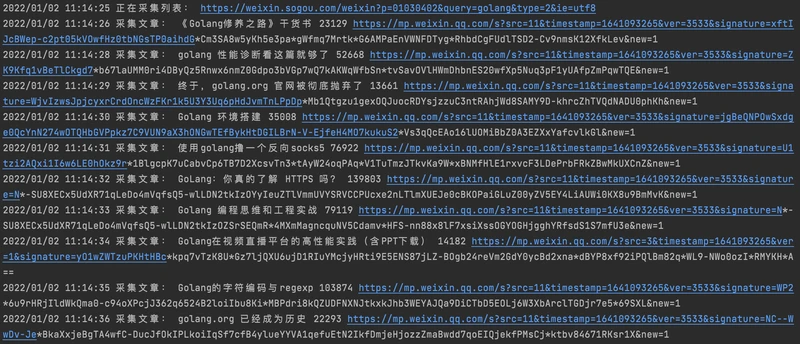最近在在采集微信文章的时候,遇到了点棘手的问题,通过搜狗搜索的微信搜索模式,使用普通的直接抓取页面的方式,无法绕过搜狗搜索的验证,因此使用gorequest成功的采集到微信文章。
选择chromedp + Headless Chrome
面对采集目的没实现的问题,我就这么放弃了吗?显然是不可能的。你不就是有签名验证嘛,只要不是要求输入验证码,总还是有办法解决的(蒽,一般的验证码也可以解决)。于是祭出golang下采集神器:chromedp。
简单点说,chromedp就是golang语言用于调用 Chrome Debugging Protocol 来实现模拟浏览器行为的可以使用简单的方式来驱动浏览器的一个包。使用它的前提只有简单的一个,那就是在你的电脑上安装上Chrome浏览器就可以了。
Chrome浏览器在的安装,在Windows下和macOS下都没问题,在桌面版的Linux下也问题不大。但想要在Linux服务器版上安装Chrome,就不是那么简单的事情了,至少目前来说Chrome还没有可以直接在服务器上安装的软件包。
但刚想好的法子又要放弃了吗?当然也是不可能的。翻翻chromedp的文档,刚好发现了一段话:
The simplest way is to run the Go program that uses chromedp inside the chromedp/headless-shell image. That image contains headless-shell, a smaller headless build of Chrome, which chromedp is able to find out of the box.
他的意思就是说:最简单的方法是使用 chromedp 调用 chromedp/headless-shell 镜像。 chromedp/headless-shell 是一个包含较小的Chrome无头浏览器的docker镜像。
好嘞,既然是一个docker镜像,我们就用docker安装它。
首先登录到我们的linux服务器,以下操作是认为你已经登录了Linux服务器了。
安装docker 和安装 chromedp/headless-shell
如果你的服务器已经安装了docker,则这一步跳过。
使用yum安装docker
yum install docker
安装完了,这时候docker还不能直接使用,需要执行下面这个命令来激活
systemctl daemon-reload
service docker restart
接着安装 chromedp/headless-shell 镜像
docker pull chromedp/headless-shell:latest
等待安装完毕,接着运行 docker镜像
docker run -d -p 9222:9222 --rm --name headless-shell chromedp/headless-shell
运行起来后,测试下chrome是否正常:
curl http://127.0.0.1:9222/json/version
如果看到类似以下内容,表示chrome浏览器工作正常
{
"Browser": "Chrome/96.0.4664.110",
"Protocol-Version": "1.3",
"User-Agent": "Mozilla/5.0 (X11; Linux x86_64) AppleWebKit/537.36 (KHTML, like Gecko) Chrome/96.0.4664.110 Safari/537.36",
"V8-Version": "9.6.180.21",
"WebKit-Version": "537.36 (@d5ef0e8214bc14c9b5bbf69a1515e431394c62a6)",
"webSocketDebuggerUrl": "ws://127.0.0.1:9222/devtools/browser/a41cd42b-99ef-4d5b-b9e6-37d634aa719a"
}
chromedp 代码调用 chromedp/headless-shell 采集微信公众号文章内容
上面已经可以正常的在 linux下使用 Headless Chrome 无头浏览器了。剩下的就是代码调用它的事了。
下面我们开始编写采集微信文章用到的chrome代码:
定义 keyword、artile struct.go
package main type Keyword struct { Id int64 `json:"id"` Name string `json:"name"` Level int `json:"level"` ArticleCount int `json:"article_count"` LastTime int64 `json:"last_time"` //上次执行时间 } type Article struct { Id int64 `json:"id"` KeywordId int64 `json:"keyword_id"` Title string `json:"title"` Keywords string `json:"keywords"` Description string `json:"description"` OriginUrl string `json:"origin_url"` Status int `json:"status"` CreatedTime int `json:"created_time"` UpdatedTime int `json:"updated_time"` Content string `json:"content"` ContentText string `json:"-"` }
编写核心代码 core.go
package main import ( "context" "fmt" "github.com/chromedp/cdproto/cdp" "github.com/chromedp/chromedp" "log" "net" "net/url" "strings" "time" ) func CollectArticleFromWeixin(keyword *Keyword) []*Article { timeCtx, cancel := context.WithTimeout(GetChromeCtx(false), 30*time.Second) defer cancel() var collectLink string err := chromedp.Run(timeCtx, chromedp.Navigate(fmt.Sprintf("https://weixin.sogou.com/weixin?p=01030402&query=%s&type=2&ie=utf8", keyword.Name)), chromedp.WaitVisible(`//ul[@class="news-list"]`), chromedp.Location(&collectLink), ) if err != nil { log.Println("读取搜狗搜索列表失败1:", keyword.Name, err.Error()) return nil } log.Println("正在采集列表:", collectLink) var aLinks []*cdp.Node if err := chromedp.Run(timeCtx, chromedp.Nodes(`//ul[@class="news-list"]//h3//a`, &aLinks)); err != nil { log.Println("读取搜狗搜索列表失败2:", keyword.Name, err.Error()) return nil } var articles []*Article for i := 0; i < len(aLinks); i++ { href := aLinks[i].AttributeValue("href") href, _ = joinURL("https://weixin.sogou.com/", href) article := &Article{} err = chromedp.Run(timeCtx, chromedp.Navigate(href), chromedp.WaitVisible(`#js_article`), chromedp.Location(&article.OriginUrl), chromedp.Text(`#activity-name`, &article.Title, chromedp.NodeVisible), chromedp.InnerHTML("#js_content", &article.Content, chromedp.ByID), chromedp.Text("#js_content", &article.ContentText, chromedp.ByID), ) if err != nil { log.Println("读取搜狗搜索列表失败3:", keyword.Name, err.Error()) } log.Println("采集文章:", article.Title, len(article.Content), article.OriginUrl) articles = append(articles, article) } return articles } // 重组url func joinURL(baseURL, subURL string) (fullURL, fullURLWithoutFrag string) { baseURL = strings.TrimSpace(baseURL) subURL = strings.TrimSpace(subURL) baseURLObj, _ := url.Parse(baseURL) subURLObj, _ := url.Parse(subURL) fullURLObj := baseURLObj.ResolveReference(subURLObj) fullURL = fullURLObj.String() fullURLObj.Fragment = "" fullURLWithoutFrag = fullURLObj.String() return } //检查是否有9222端口,来判断是否运行在linux上 func checkChromePort() bool { addr := net.JoinHostPort("", "9222") conn, err := net.DialTimeout("tcp", addr, 1*time.Second) if err != nil { return false } defer conn.Close() return true } // ChromeCtx 使用一个实例 var ChromeCtx context.Context func GetChromeCtx(focus bool) context.Context { if ChromeCtx == nil || focus { allocOpts := chromedp.DefaultExecAllocatorOptions[:] allocOpts = append(allocOpts, chromedp.DisableGPU, chromedp.Flag("blink-settings", "imagesEnabled=false"), chromedp.UserAgent(`Mozilla/5.0 (Macintosh; Intel Mac OS X 10_15_7) AppleWebKit/537.36 (KHTML, like Gecko) Chrome/96.0.4664.55 Safari/537.36`), chromedp.Flag("accept-language", `zh-CN,zh;q=0.9,en-US;q=0.8,en;q=0.7,zh-TW;q=0.6`), ) if checkChromePort() { // 不知道为何,不能直接使用 NewExecAllocator ,因此增加 使用 ws://127.0.0.1:9222/ 来调用 c, _ := chromedp.NewRemoteAllocator(context.Background(), "ws://127.0.0.1:9222/") ChromeCtx, _ = chromedp.NewContext(c) } else { c, _ := chromedp.NewExecAllocator(context.Background(), allocOpts...) ChromeCtx, _ = chromedp.NewContext(c) } } return ChromeCtx }
编写入口文件 main.go
package main import "log" func main() { word := Keyword{ Name: "golang", } result := CollectArticleFromWeixin(&word) for i, v := range result { log.Println(i, v.Title, len(v.Content), v.OriginUrl) log.Println("纯内容:", v.ContentText) } }
运行结果测试:

很棒结果出来了。
如果你对此代码感兴趣,可以从这里获得github.com/fesiong/goblog 。
此采集代码仅供研究学习之用,不可用于非法用途。
